the empire has no clothes
military looting of underwear in Gaza recalls WWII "sweetheart lingerie"
FYI: this piece discusses military sexual violence.
Last week, the Slow Factory and Stef Kaufman posted on Instagram about the concept of Soul Loss to describe “the depth of non-humanity we are witnessing from the Israeli Occupation” in Gaza. The post was accompanied by several images of the Israeli-inflicted violence on Palestinians, and the mockery of that violence. Like many of the horrific photos and videos we’ve been seeing—of a genocide happening in real time on our phones—there are certain images that stay with you forever because they portray something so incomprehensibly cruel. Soul Loss.
I couldn’t get that particular image out of my head, where three IDF soldiers are “showing off” a Gazan woman’s underwear to the camera. A lump formed in my throat as my eyes took in the image: the absence of the woman, the bright red color of the garment against the military uniforms, the chilling expression in their faces.
Throughout the genocide, IDF soldiers have looted the homes and belongings of Palestinians. There are videos online of soldiers rummaging through boxes of clothing and jewelry in destroyed homes. In a Facebook group, an Israeli woman posted a photo of a plastic bag full of makeup, with a caption asking what she should do with the “gifts from Gaza” that her husband, an IDF soldier, brought back for her.
Eyeshadow palettes and underwear: these objects have intimate relationships with their wearers, and that’s what makes it insidiously violative to loot as a “gift” or “trophy.” This perverse practice of stealing Palestinian women’s personal objects—objects that touch a skin, a body—and treating them as “souvenirs” of conquest to gift to their wives is a form of sexual violence. The production and circulation of these images among the Israeli military is a tactic to perpetuate violence against Palestinian bodies, beyond and without physical contact.
I want to connect this aspect of the genocide in Palestine right now with a piece of WWII fashion history known as “sweetheart lingerie.” Both tell stories about how underwear can play a hand in perpetuating the violence of imperialism and colonization.
During WWII and the rise of Western imperialism in the Asia-Pacific (1940s and 1950s) American soldiers were deployed to several countries that made up what the U.S. military called the “Pacific Theater.”
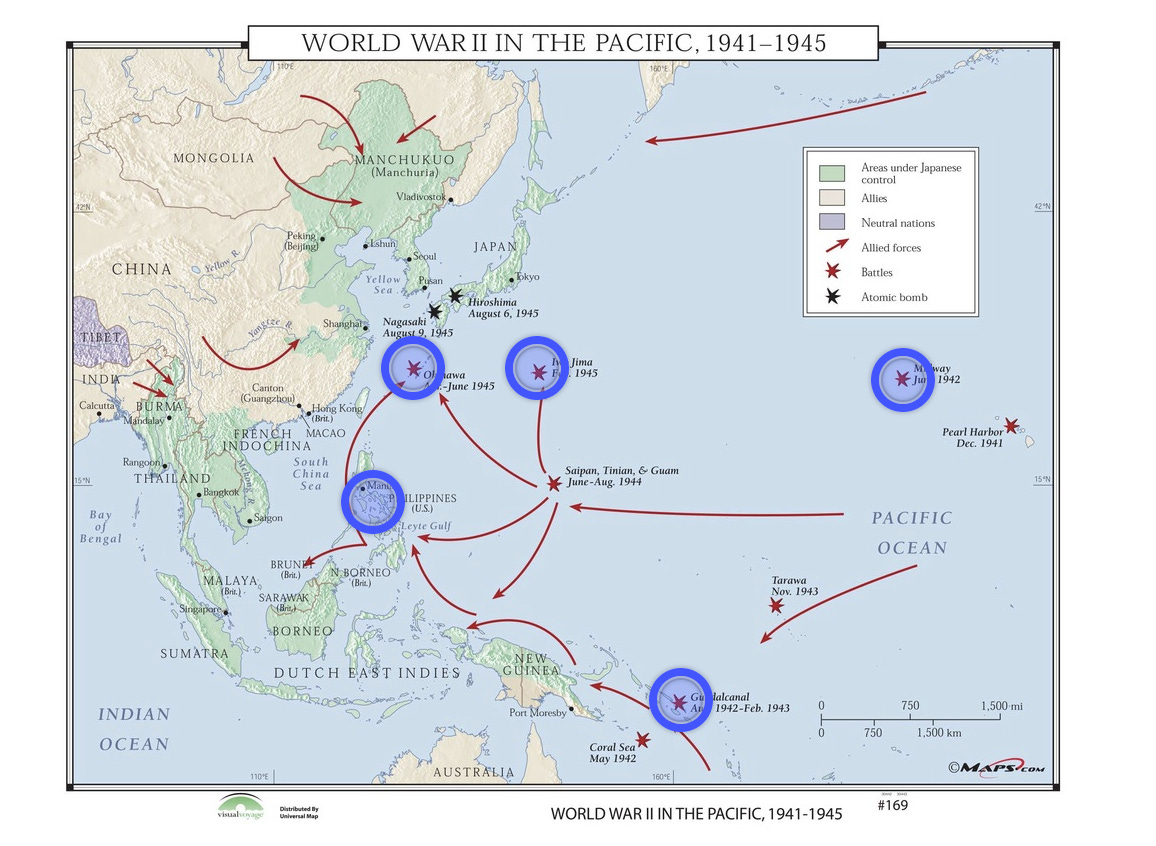
It was in this context of war and post-war occupation American soldiers would purchase embroidered underwear sets to send back home to wives and girlfriends—aka, “sweetheart lingerie.” These sets were typically made from nylon or silk, and sold by local women. They were embroidered with Asian stylistic elements such as dragon and floral motifs. In combing through listings of these underwear sets, I noticed a few that were embroidered with the year and location—usually somewhere in Japan or the Philippines. Some of them include phrases like “don’t touch,” implying that the women should should sexually faithful while the men were abroad. Others have the words “sweet” and “sour” embroidered on the bust cups, a reference to the sweet and sour sauce characteristic of Chinese-American food. This generalized grouping of Asian aesthetic references, regardless of their ethnic specificity, reflected the Orientalist tropes of the time.
While “sweetheart lingerie” was produced for American women to consume (rather than a garment that belonged to someone killed by an American soldier), there are parallels in how they uphold systems of patriarchal power and Western imperialism. Similar to the instance of Israeli women posting “gifts from Gaza” on social media, these garments are a way that military wives bolster nationalist ideals. It’s colonizer souvenir culture. You could imagine that in the 1940s version of a Facebook group, American military wives would receive these underwear sets in the mail and tell their friends about them as a way of performing patriotic values.
Let’s do a deep dive on about this set made in Okinawa, Japan in 1952. What was happening at that place and time?
From 1945 to 1972, Okinawans lived under American military occupation. To this day, there are American military bases on the island (a paper from 2022 states that half of all U.S. military personnel in Japan reside in Okinawa). Context is important here, because it tells us that this exact pair of underwear was made during post-war occupation, when sexual violence committed by U.S. forces against Okinawan women was rampant. There was a particularly horrific incident, known as the “Yumiko-chan incident,” that sparked the first massive protest against U.S. occupational policies in 1956.
On the crotch of the underwear, “Off Limits” is embroidered. Soldiers used underwear to communicate messages of whose body they were entitled sexual access to (their wives back home, the women in the countries they were colonizing).
When I see postings of “sweetheart lingerie” for sale on Instagram, the comments tend to be from vintage enthusiasts who admire their “kitschy” appeal. The atrocities of war and postwar occupation seem distant enough that it is absent from the conversation. What remains is a nostalgic, romanticized framing of love in the time of war (i.e. how sweet that a soldier sent this back home to his beau!).
Learning about the history of garments allows us to be more critical about how we relate to them. As a vintage clothing lover myself, I’ve start thinking more about how interacting with garments from the past can feel…spiritually unsettling at times. There’s some evil, dark energy in clothing that I don’t want to touch. Some old Levi’s from the 19th century have tags that say “the only kind made by white labor” which was a selling point during the Chinese Exclusion Act period.
Of course, the meaning of clothing changes depending on its temporal context and identity of its wearer. I hope that vintage enthusiasts can understand the historical context of “sweetheart lingerie” and interrogate how garments can perpetuate oppressive ideologies.
Underwear—the most intimate piece of clothing—reveals so much about bodies and power. I’d love to hear your thoughts and reflections on this topic.
Thank you for reading! Feel free to share this post if you enjoyed it. This newsletter is made possible by paid subscriptions. If you have the means, $8/month supports my writing and research for history deep dives like this.




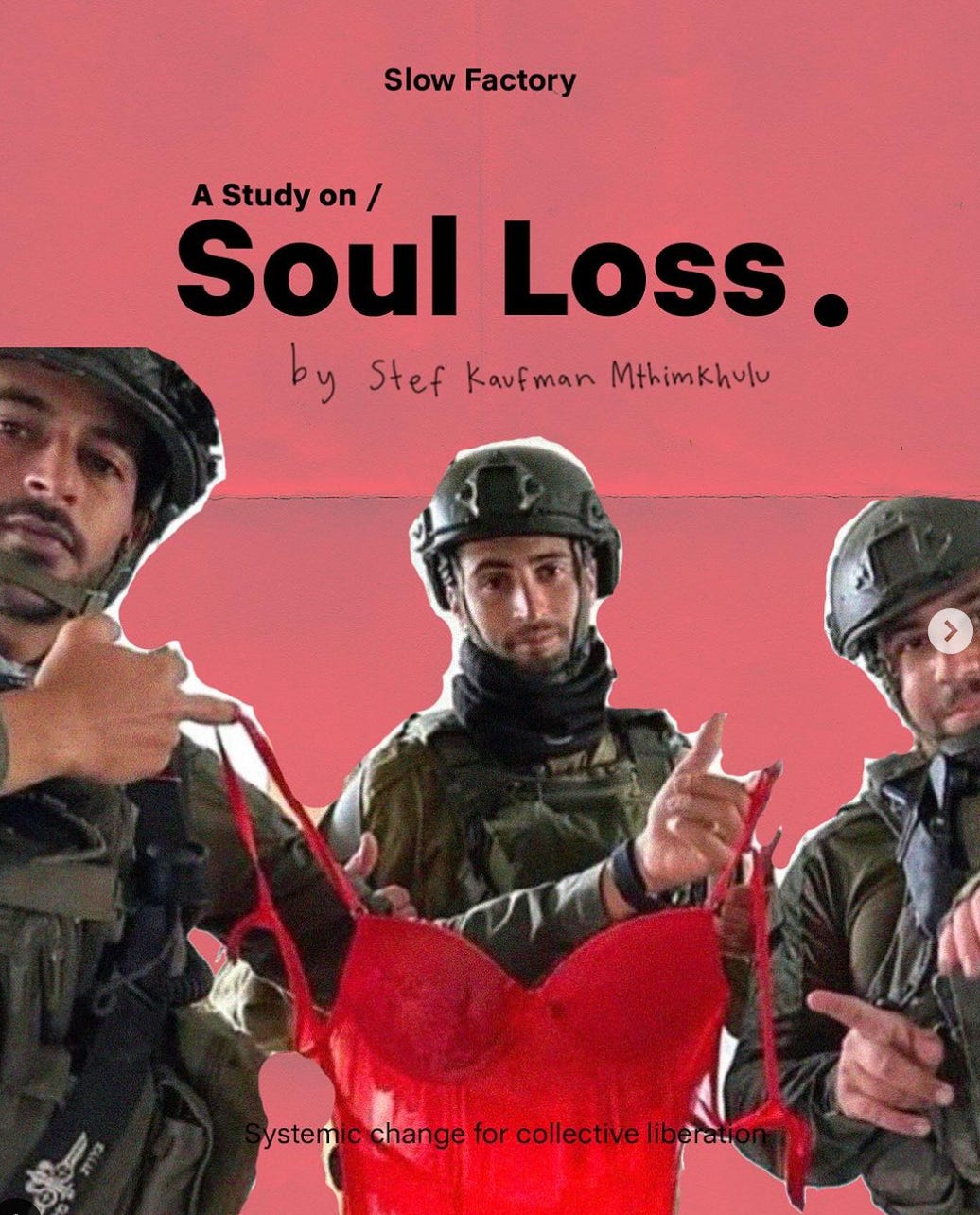

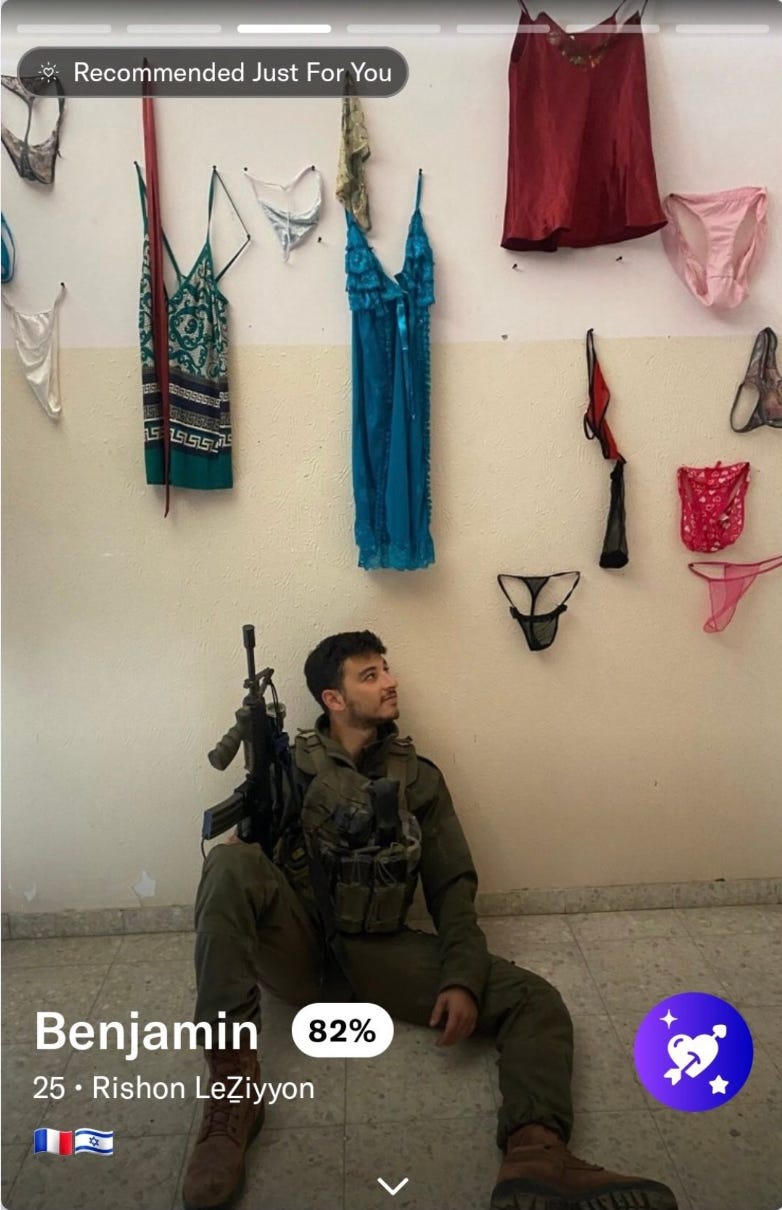
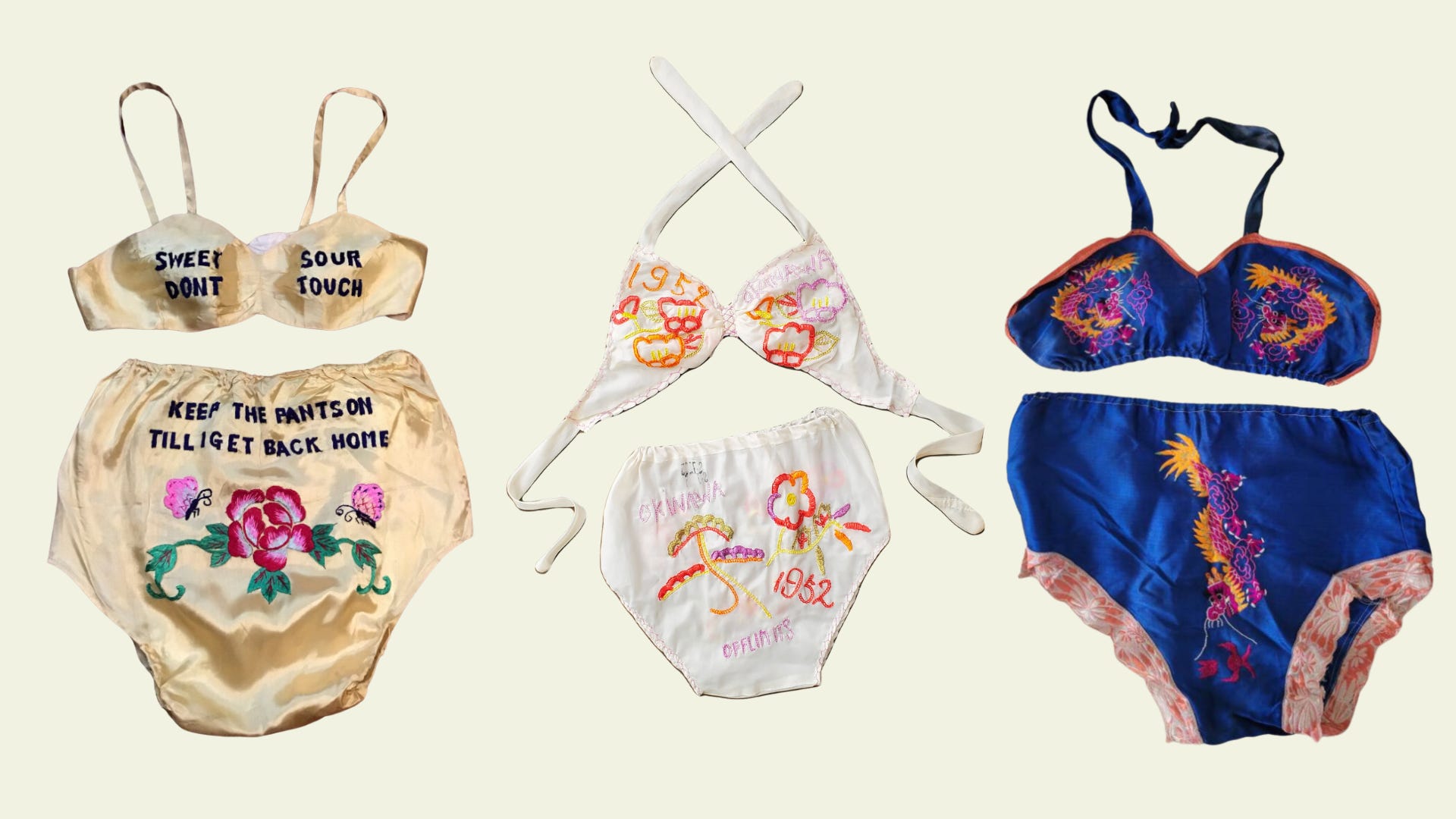
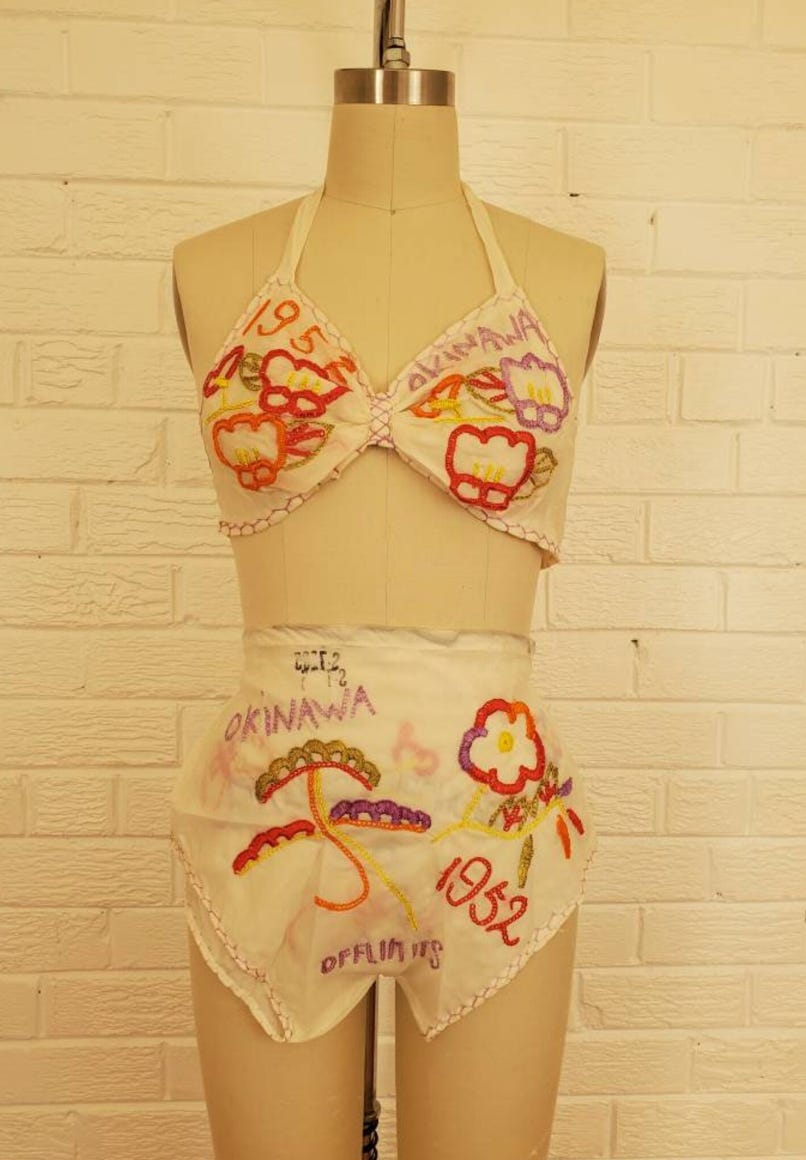

As a Muslim woman, this is especially horrific given the importance of modesty in our religion and cultures. Having your underwear displayed and captured as 'war prizes' is degrading and dehumanizing for anyone. As a woman who wears the hijab, as many women in Gaza do, going to great lengths to ensure that not even our hair is shown in public, this would be devastating. It makes me sick.
Didn't know about the history of 'sweetheart lingerie' or that there even was such a thing, thank you for sharing this is a lot to think about.
I actually have seen the first image in a notoriously cynical forum, the kind populated by reactionaries, and it's rather telling that even there, the unanimous reaction was disgust at the conduct of the IDF soldiers and concern for the fate of the owner of those clothes (someone - imo correctly - also pointed out that there were overtones of disbelief on the part of the soldiers at the idea that Muslim women can be sexual beings and are so of their own volition, I'm trying to phrase it in a less crude way than they did but that was the gist). I don't know how anyone could do this without suffering the phenomenon you describe, 'soul loss' seems to be the accurate way of putting it.
I'm old enough to remember when wearing kufiya caught on among young non-Palestinians in the 00s as a symbol of solidarity with Palestine or even as a trend (shameful as turning any tradition into a trend is, but a lot of people wore them). Back then if any of them were captured on a street style blog (this being before the days when 'street style' = 'sponsored/borrowed outfit outside a fashion show'), you could count on having multiple comments calling them things like 'terrorist sympathiser' and such. Now I see people attacking teenagers online for wearing a sweatshirt with a watermelon on.... like they're busy shaming Palestinian solidarity that's sartorially expressed by choice but those same people are perfectly fine with IDF soldiers turning Palestinian women's intimate gear into public consumption.